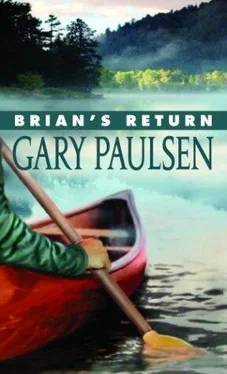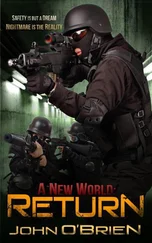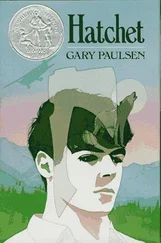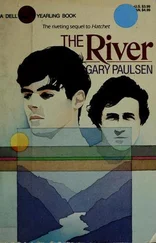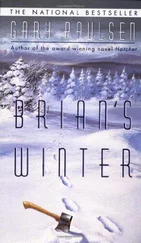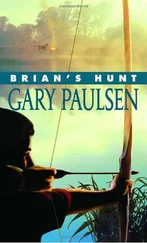Brian smiled as he watched it leave. He didn’t know if it was a female but thought of it that way because the only other skunk he’d known closely had been a female that had ‘‘adopted’’ him and moved in with him when he’d spent the winter in the North. She had saved him from a bear and he would always have a soft spot for skunks.
In the east the sky was faintly light and Brian decided to get up and get ready. The pilot had said daylight-thirty and that would be in not much over an hour.
He made a small fire and put some water on to boil and dropped a pinch of tea in the water. While it was heating and boiling he rolled his bag and took the tent down and repacked it.
For a time he had nothing to do and he sat watching the fire, feeling hunger come back. The fish and broth had filled him but hadn’t lasted long and he didn’t have time now to fish and cook before it was time to leave. Hunger was an old friend. Once it had been an enemy and he had panicked whenever he felt the edges of it, but now he knew he wouldn’t die if he didn’t eat right away, or even this day, and he mentally tightened his belt.
Besides, he had some sugar cubes. He put three of them in the tea and drank it out of the pot as soon as it had cooled enough, and the hunger was knocked down.
He used the empty pot to pour water on the fire, killed it completely and stirred the ashes into slush. Then he loaded his pack and sleeping bag back on the plane and sat on the dock waiting.
Somewhere nearby a loon called for the morning, the sound flowing gently across the lake, and it seemed then, for a moment, as if he’d never been gone. As if the past two years and more had not existed and he’d stayed in the bush.
This lasted until he heard a motor and looked up to see an old Jeep Cherokee rattling down the ruts to the shack. There was a canoe on top and the pilot and two men inside.
Brian stood and waited as the Jeep parked. The three of them got out and took the canoe down and moved onto the dock.
He’d been dreading meeting the fishermen. All the magazines he’d read and some of the shows he’d watched on television had left a bad taste in his mouth about so-called professional fishermen. He didn’t feel like explaining himself to anybody. The pilot knew who he was, knew the Small horns and that he was going to visit them — or assumed it. Now there were two others who would ask questions.
But Brian was wrong.
The men were old — past sixty — but still moving well. They took the canoe down and tied it on the off float of the plane, the one away from the dock, with practiced ease. They looked so much alike that Brian thought they must be brothers. Square-jawed and balding; what hair they had was gray and bristly. They smiled easily, said hello to Brian, but didn’t ask more from him.
The plane was almost full by the time the men got their gear behind the rear seat. Brian moved his packs back as well and slid into the rear seat. The plane only took four adults so one of the old men sat next to him and oddly enough it was Brian who wanted to question them. Their fishing equipment wasn’t new or high-tech. The reels were old casting reels, obviously well kept, and the men handled them with an almost loving care.
Brian was silent until they were in the air and then he turned to the man next to him. ‘‘Do you fish a lot?’’
The man had been looking out the window, down at the lakes, and he turned and smiled. ‘‘Once a year. We go up into the bush lakes and fish for muskies. We catch and release them — actually, we hardly ever catch them because we cast and use plugs we made ourselves. I haven’t caught one now in. . Ben, when did I last catch a muskie? Was it two years ago?’’
The man in the front turned. ‘‘Yes. No. I think it was three. We’ve had a lot of strikes since then but no boaters. Why?’’
‘‘I was just telling the boy about our fishing.’’
‘‘Nonfishing, you mean. We never seem to catch anything.’’
The man next to Brian nodded. ‘‘But we see the country and that’s what it’s all about, isn’t it?’’ He studied Brian, his eyes questioning.
‘‘Yes.’’ Brian looked out the window. ‘‘That’s what it’s all about. .’’
‘‘We worked the woods all our lives.’’ Ben, the man in front, turned. ‘‘Cruising for the lumber companies, living. Just living. We’re down in the Cities now but once you’ve been in the woods — well, you can take the man out of the woods, but you can’t take the woods out of the man. We like to get back. Muskie fishing is just an excuse.’’
The man next to Brian nodded. ‘‘It must be the same for you. We heard about you, saw it all on television back when it happened. You must have got the woods in you then.’’
Brian nodded.
‘‘It’s a wonderful thing,’’ the old man said, looking again out the window.
‘‘What?’’
‘‘To have the woods in you. Young people almost never have it now. You’re very lucky.’’
And Brian knew he was right. He’d never felt he was particularly fortunate before but the old man was exactly right. He was very lucky to have the woods in him and to be getting back to it. ‘‘I hope you have good fishing,’’ he said, and meant it.
‘‘And you as well. I hope everything comes to you that you want.’’
Brian smiled and watched the woods and lakes unroll beneath the plane. The droning of the engine made him drowsy and his eyes closed, then opened again, and he thought — looking across the wilderness, half-asleep — he thought, lord, what a wonderful place this is, and knew it was a kind of prayer.
The List
CANOE, 17-foot, Kevlar, named The Raft, from my time with Derek on the river. With two wide wood paddles with glassed tips. Repair kit with a piece of glass cloth and epoxy resin. Light life-vest flotation device.
STRAIGHT BOW, Wood-and-glass-laminated, 45-pound pull at 26-inch draw, 4 extra strings. 100 cedar arrow shafts, all spine tested for stiffness to match the bow. 60 field points, 50 MA-3 broadheads, nocks, precut 4-inch feathers — turkey, not plastic — glue to make everything, point cement, small fletcher to put feathers on, plastic tapering tool to work shafts down to take the points and nocks.
He debated long on the arrows — whether to take premade arrows or the materials to make them and in the end did both. He had two dozen finished arrows, half broadheads and half field points.
Small stone and file to sharpen broadheads. Plain leather quiver to hang down the center of my back.
Again, he debated whether to use a standard over-the-shoulder quiver or a center-hung with double harness. He decided on the center quiver because his head would protect the arrows and keep them from hitting things when he was moving through the brush.
KNIFE, Plain hunting-style knife with cross hilt and straight 6-inch flat blade sharpened on one side except for the tip, to be sharpened also on the top back about 2 inches. A tool — and a weapon. Use the same stone and file for sharpening the broadheads to sharpen the knife and hatchet.
HATCHET
There were many variations he could have gone with here, as with knives, but he chose a plain belt ax, not unlike the one his mother had given him when he started north the first time. Like the knife, it was always on his belt and would always be there. He had learned that it was much better to have a tool-weapon with you and not need it than it was to need one and not have it.
FISHING GEAR, Nothing fancy. 2 spools of braided line, 20-pound test, a dozen metal leaders and a container of small sinkers, the kind with the rubber twist center. Small plastic box with 100 assorted fishhooks. No rod, no reel, just the hooks, line and sinkers.
Читать дальше
